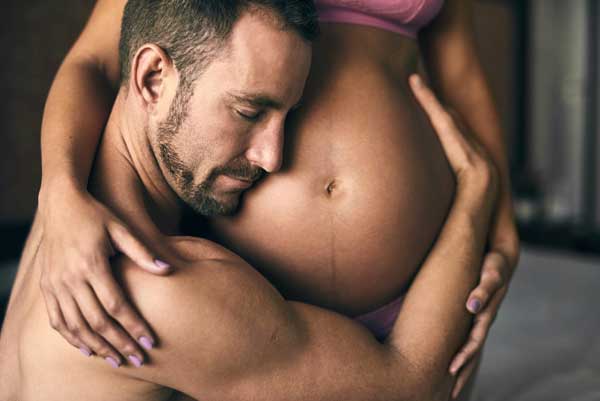For many couples, the journey to parenthood is filled with joy, though for some it can be marked by challenges. This was the case in my own story, which I’d like to share today especially for those who have struggled with infertility or pregnancy loss.

Finding Out I Was Pregnant, Then Dealing With Ectopic Pregnancy
About five years ago, my husband and I discovered we were unexpectedly pregnant. Like any married couple would be, we were thrilled by the news. However, within days I began bleeding and went for an ultrasound, which revealed nothing in my uterus. Soon after I was rushed to the ER and diagnosed with an ectopic pregnancy, requiring surgery to remove one of my fallopian tubes.
This all happened so fast, I barely had time to process what was happening. In the weeks following, I tried to wrap my mind around it all. The terrifying thought crossed my mind: will I ever be able to get pregnant again and have children with only one fallopian tube?
Second Pregnancy Ends in Miscarriage, Leaving Me Questioning My Fertility
Two years later, I became pregnant again, unexpectedly. We were excited but also anxious, since my chances of another ectopic pregnancy were much higher, which could mean I’d never conceive naturally again if I lost my other tube.
At our first ultrasound, we saw the gestational sac in the right place, which was reassuring. But at our next appointment, no heartbeat could be detected and I was diagnosed with a miscarriage. I was devastated, feeling like my world was crumbling.
Two pregnancies, one ectopic and one miscarriage, zero children. Would I ever be able to have a baby? My husband and I remained determined, continuing our research to find solutions.
Discovering Key Supplements That Changed Our Fertility Journey
Through consulting numerous doctors, tests, and personal research, we discovered a combination of supplements that changed our lives, allowing us to conceive a healthy boy on our first try when we began actively trying to get pregnant.
As a pharmacist, I knew vitamins were important for conception, but our pregnancies were unplanned so we couldn’t prepare with the right nutrients. In this article, I’ll share the evidence-based vitamins I personally took that can aid your own fertility journey.
Understanding Folate, Folic Acid, and MTHF for Fertility
You’ve likely heard about folic acid for pregnancy. But you may not know the difference between folate, folic acid, and methyltetrahydrofolate (MTHF), making it hard to choose the right nutrient.
Folate is vitamin B9 naturally found in foods like leafy greens, legumes, and citrus. It’s easily used by the body. Folic acid is the synthetic form in most prenatals and fortified foods. MTHF is the active, natural form of folate that your body can directly use without conversion.
To understand: when taking folic acid or dietary folate, your body must convert it through several pathways to 5-MTHF to utilize it. Problems arise if you have the MTHFR gene variant affecting this conversion.
About 40% of people have this variant, with higher rates in Caucasians. Pregnant women need high folate to prevent neural tube defects. If you have the MTHFR variant, it can impact your folate levels. Since folate regulates DNA, without healthy DNA, a successful pregnancy is very unlikely.
Another reason folate is key in pregnancy is it works with B12 to convert harmful homocysteine into a safe form. This prevents high levels that can damage blood vessels, which are essential for fertility and sustaining pregnancy.
One large case study of infertile couples found that 5-MTHF supplementation led to successful pregnancy for 13 spontaneously and 17 with assisted reproductive technology.
MTHF offers maximum benefits no matter your gene variants since it’s the most bioavailable form of folate. Your body doesn’t have to work hard to convert and access its benefits.
Vitamin B12’s Important Role in Fertility
Vitamin B12 supports various functions like forming blood cells and DNA. But did you know it might also play a role in fertility?
Adequate B12 levels have been associated with healthy ovulation and egg maturation. One study found serum and follicular fluid B12 levels positively correlated with embryo quality.
As mentioned, B12 and folate disruptions can lead to high homocysteine, causing fertility issues like difficulty conceiving. Your body can’t make B12, so adequate dietary or supplemental intake is key.
Good food sources include meat, eggs, dairy and fortified cereals. But supplementation may be beneficial if you follow a vegetarian/vegan diet, have gastrointestinal conditions, or use certain medications.
The recommended daily B12 intake for adults is 2.4 mcg, increasing to 2.6 mcg in pregnancy. Supplements often have higher doses since your body only absorbs 1-2% of B12 from them.
B12 is too important to be low on for preconception and fetal growth. If you think you may be deficient, talk to your healthcare provider about incorporating B12 into your fertility journey.
Key Takeaways on Nutrient Supplementation for Fertility
In this article, we looked at two essential vitamins that play a role in fertility. In future articles, I’ll delve into more key supplements that can optimize your chances of natural conception.
Remember, while supplementation with the right nutrients is important, it’s just one piece of the puzzle, along with diet, exercise, and stress management. I hope this information is helpful for anyone trying to conceive after miscarriage or struggling with infertility. Please share if you know others who may benefit. Stay healthy and stay positive!
